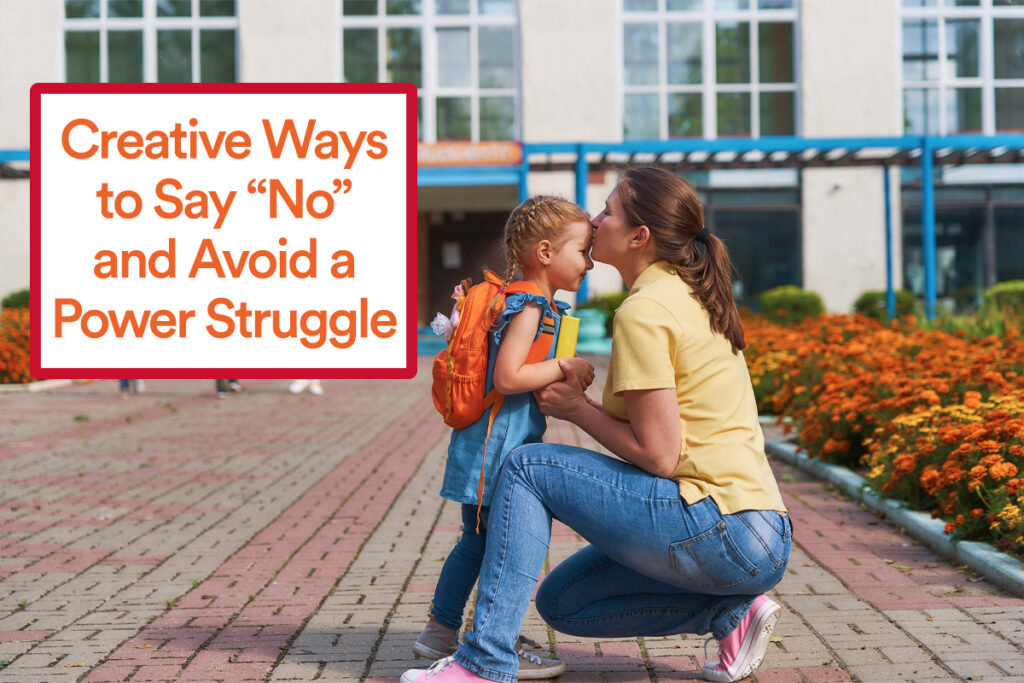By Leanne Page, MEd, BCBA; originally posted on Parenting with ABA

No means no. But other things can mean no also.
Does your child have big reactions when you tell them no? Is the word no sometimes or often a trigger for your child leading to all kinds of problem behaviors?
We have to tell our kids no. No- do not run into traffic. No- do not touch a hot stove. And no- do not stray outside of the boundaries we have set as your parents. Take all the freedom you want within these boundaries, but no don’t stray.
But are there other ways to get your point across without the word no itself. If we can avoid the word that triggers the big reactions, maybe, just maybe we can avoid those meltdowns completely and spend our efforts focused on teaching and building up the good stuff.
What are some other ways to say no?
- Not right now.
- You can do (this) instead.
- Maybe another time.
- We have to do ____ right now.
- Sure you can (do/have) that after you do (this) first.
- Please do (this) instead.
- I wish we could, but…
- I’m afraid not.
- I don’t think so.
- Bummer! Not right now.
- That’s not possible right now.
- What a great idea, but not right now.
If you are telling your child to stop doing something or no, don’t do that action, try flipping your phrasing to what they CAN do instead.
| From this | To that |
| No running. | Walk. |
| No jumping on the couch. | Sit on the couch. |
| No candy before dinner. | You can have candy at or after dinner. |
| No yelling. | Use your inside voice. |
| No grabbing. | Ask your sibling for a turn with the toy. |
If the word no has been conditioned to cause an over the top reaction from your child, stop using the word no. Use other alternatives that get the same point across.
Whenever you find yourself about to say no, try to reframe it to tell your child what they can do or have instead. Give choices as much as possible.
Can I have some candy?
You can have some grapes or a banana.
Can we go to the park?
We can play trains or lego at home right now.
Child is running around the house.
You can walk in the house or run in the backyard.
No means no. But other wording also means no and is associated with a learning history of problem behavior. If something super simple like changing up our wording can help us move more quickly past the problem behavior- why not try it?! We want to spend our time and energy on teaching the more appropriate ways to communicate wants and needs instead of just dealing with problems.
Leanne Page, MEd, BCBA, is the author of Parenting with Science: Behavior Analysis Saves Mom’s Sanity. As a Behavior Analyst and a mom of two little girls, she wanted to share behavior analysis with a population who could really use it- parents!
Leanne has worked with children with disabilities for over 10 years. She earned both her Bachelor’s and Master’s degrees from Texas A&M University. She also completed ABA coursework through the University of North Texas before earning her BCBA certification in 2011. Leanne has worked as a special educator of both elementary and high school self-contained, inclusion, general education, and resource settings.
Leanne also has managed a center providing ABA services to children in 1:1 and small group settings. She has extensive experience in school and teacher training, therapist training, parent training, and providing direct services to children and families in a center-based or in-home therapy setting.
Leanne is now located in Dallas, Texas and is available for: distance BCBA and BCaBA supervision, parent training, speaking opportunities, and consultation. She can be reached via Facebook or at Lpagebcba@gmail.com.
